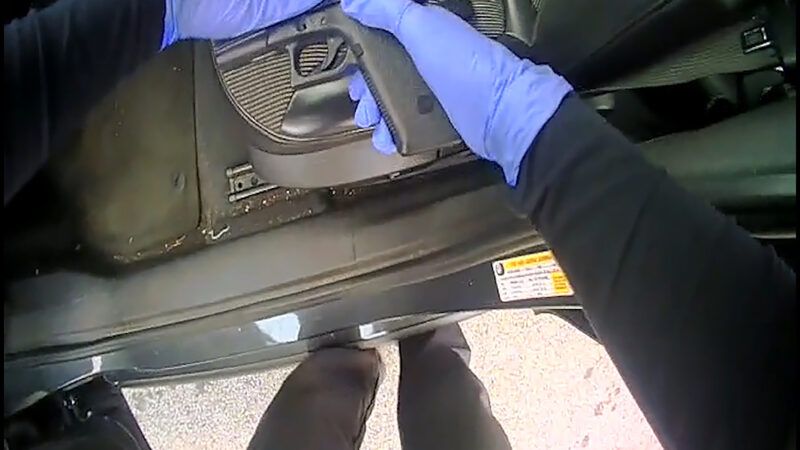The Problems With Just Getting Guns Out of People's Hands as a Solution to Gun Violence
New study sees Chicago harassing and arresting people for paperwork violations, damaging their ability to live and work, without demonstrable effect on gun violence

When hideous murders committed with guns make national news, as in today's Nashville school shooting, it is a natural reaction on many people's parts to call passionately for just getting more guns out of more people's hands, by any means necessary.
Those concerned with civil liberties and police abuse of the innocent have long worried about the effects of privileging mere gun possession arrests. A new study from the Marshall Project highlights some of these problems, via examining data and interviewing arrestees from Chicago's attempts to manage its violence problem with more gun possession arrests.
Chicago police seem to have adopted a pattern of pretextual stops—looking for any excuse to pull someone over and interact with them—in order, they hope, to find a gun without a proper permit to own or license to carry. (Getting both those things can be quite expensive in terms of both time and money, disproportionately affecting the poor living in violent neighborhoods who most strongly feel the pull toward having a gun for self-defense.) Gun law enforcement in Chicago, the Marshall Project finds, "overwhelmingly focuses on possession crimes — not use."
The heart of the study's findings:
From 2010 to 2022, the police made more than 38,000 arrests for illegal gun possession. These arrests — almost always a felony — doubled during this timeframe. While illegal possession is the most serious offense in most of the cases we analyzed, the charges often bear misleading names that imply violence, like "aggravated unlawful use of a weapon."
Police continue to insist that every gun out of someone's hands, even if it involves arresting that person and increasing mass incarceration of the nonviolent and highly harming that person's ability to work and rent in the future, is all for the good; after all, that gun won't be used by that person to harm anyone. (It is almost always the case that those guns would not have unjustly harmed anyone even minus the arrest and confiscation.)
But there is no particular evidence that harassing or arresting those who have harmed no one has "substantially reduced shootings in Chicago. In fact, as possession arrests skyrocketed, shootings increased, but the percentage of shooting victims where someone was arrested in their case declined," that latter point a strong indication that mere possession arrests are not a sensible high priority for police for whom gun violence should be their only concern when it comes to guns, not paperwork violations. But the Project found that "nearly 60% of the 31,000 new felony cases pursued by [the state's attorney of Cook County, Illinois] in the past three years were for illegal gun possession; roughly 4% were for homicides."
Among the gun arrests the Marshall Project were able to analyze from raw data, "Most people [arrested] had no arrest warrants out, nor were they on supervised release, probation or suspected of being in a gang. In most of the incidents we analyzed, police were not responding to 911 calls about a person with a gun."
The fight against mere possession becomes a generalized excuse for harassment of citizens: "In arrests where possession was the most severe charge…we found that more than 7 in 10 began with a simple traffic violation. After this initial stop, police often used some other justification for a search. Officers often did this by citing the smell of marijuana. Although Illinois legalized cannabis in 2020, smoking while driving is still prohibited." And, "in a third of the stops, we found the person arrested had their gun owner's permit, but not the license that allowed carrying the loaded gun in public."
The enforcement is hugely disproportionate racially. "Although Black people comprise less than a third of the city's population, they were more than 8 in 10 of those arrested for unlawful possession in the timeframe we reviewed." Convictions lead to a year or more in prison, and merely the arrest can mess up the life of someone who has harmed no one via "damning criminal records, time on probation, job loss, legal fees and car impoundments."
As Reason's C.J. Ciaramella has previously reported, the overzealous search for guns owned without proper paperwork has led not just to pretextual traffic stops that ruin innocent people's lives but to violent raids on homes, often not even the homes where the alleged illegal guns were supposed to be.
As the Marshall Project (who although close-focused on Chicago in this study "identified several other cities with similar trends," including Houston, New York, Cleveland, Baltimore, and Memphis) quotes one of the victims of gun possession arrests they interviewed, "I'm scared for my life — and I gotta go to prison because I fear for my life, for my family's safety? Because we're not fortunate enough to live someplace else?"
